Tuna Rice Salad is a classic Italian Summer dish that every household makes regularly during the warmer months. It’s a staple for beach days as well as picnics in the countryside. And it’s also a great one to prepare for work and school lunches.
The beauty of this dish lies in its simplicity, but that’s only when your tuna rice salad turns out flavourful. My aim with this recipe is to show you how to turn your boring rice salad into a bowl full of flavour.
What to expect: Take the first bite, preferably out of the big bowl :). Wow will be your first thought. With so much flavour, you’ll need to go for a second bite. Go ahead, plate yourself some and enjoy a lazy lunch or dinner that’s healthy too.
Let’s make it!
Insalata di riso is the term we use to call this dish.
Its main ingredient, rice, is known as riso in Italy.
Here are the Italian words for the other common ingredients you’ll find in this recipe: uova (eggs), tonno (tuna), olive (olives), pomodori secchi (sundried tomatoes), carciofi (artichokes), cipolla lunga (spring onion), prezzemolo (parsley), parmigiano (parmesan), olio extra vergine di oliva (extra virgin olive oil), sale (salt), and pepe (pepper).

Since rice is the base of this recipe, I think it’s necessary we have a look at the different types of Italian rice.
Did you know that Italy is the largest rice producer in Europe?
Its production accounts for 50% of the total rice production in the continent. CBI under the Ministry of Foreign Affairs provides more details, if that interests you.
The type of rice produced in Italy is called Japonica rice, and includes these varieties:
The first 5 varieties are the most popular and the ones being featured the most in Italian recipes, including rice salads and risotto.
These are all types of Japonica rice, which means Japanese rice.
Would you have ever guessed that Italy produces so much Japanese rice, and that those Italian dishes are made using a variety that’s actually Japanese? I am surprised too.
But I guess it all comes down to the fact that rice is intrinsically an Asian food, that originates from that area.
Italy is simply using its resources to produce a food staple that’s in high demand. The resources I am referring to include plenty of space for rice fields, the hot and humid climate, and an effective irrigation system.
Next time you’re in Italy take a tour of a few rice fields. You’ll find most of them in the Pianura Padana, which is a vast plain that expands throughout the Northern Italian regions from Piemonte to Emilia Romagna.
You’ll be able to have a look at how your favourite risotto and salad rice is produced.
The Japonica rice varieties I mentioned previously are the best types of risotto rice. That’s why Italy produces so much of them because they are required for domestic consumption and for both European and International exports.
Carnaroli, Arborio, Roma, Baldo, S. Andrea and Vialone Nano are all great options to make risotto. However, the most loved and used in Italy is Carnaroli rice.
Carnaroli rice is a longer grain rice that doesn’t release too much starch while being cooked, but still enough to make a delicious risotto.
If you are looking for an even creamier and starchy result, opt for Arborio rice.
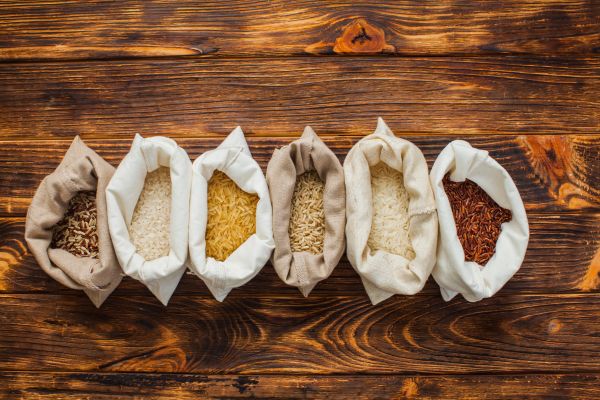
Parboiled rice is the most used by Italians to make rice salads, followed by Roma and Arborio.
It’s also the best to use in salads because it can’t be overcooked and stays separated without sticking to the other ingredients.
It’s not suitable for risotto because it doesn’t allow the amalgamation necessary to make a creamy risotto that’s only possible when the grain releases some starch.
Arborio and Carnaroli tend to be used to make arancini because they are so popular and they can also release a good amount of starch which is fundamental for the success of this recipe. These types of rice can hold the shape, release enough starch for binding but not so much that it makes the required shaping difficult.
I’d like to share with you what’s so special about an Italian cold rice salad, and how it differs from rice salads around the world.
The beauty of this dish lies in the use of a few simple high quality ingredients that are full of flavour.
This is in line with the philosophy behind all Italian cooking, and that’s what makes it authentic.
While Spanish cuisine might feature beans and avocados, it’s obvious that you’ll find authentic Italian ingredients in our Italian version. Let’s look at what these are.
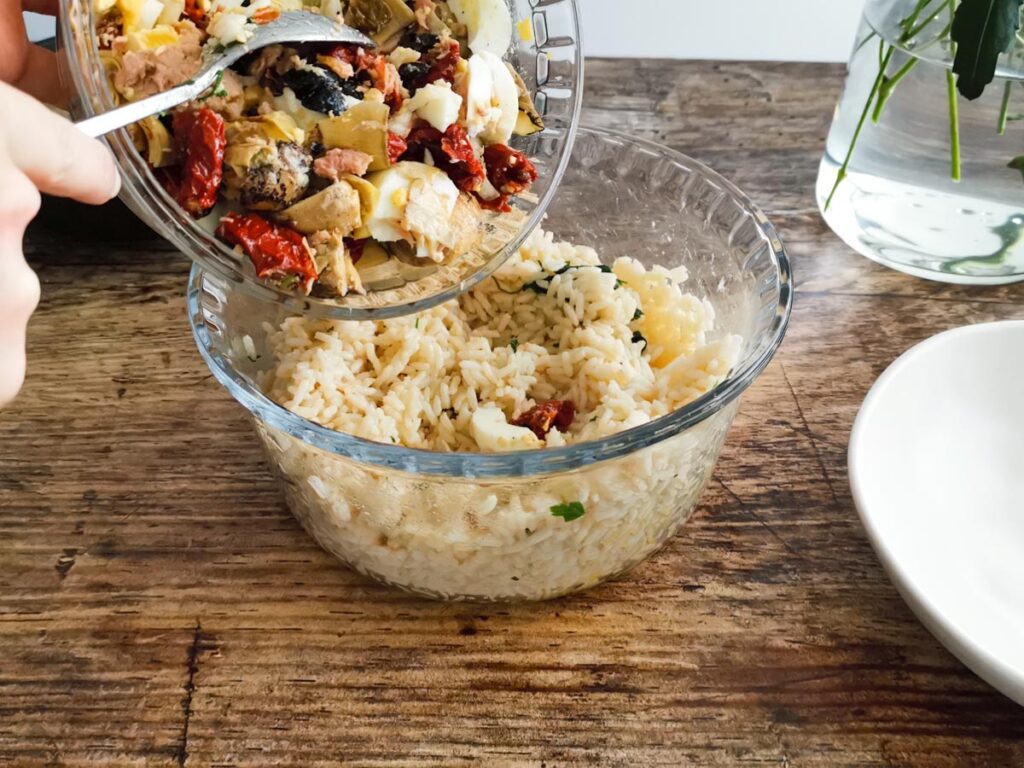
The best ingredients for rice salad happen to include many of the ingredients you’ll find on a classic Italian antipasti board.
The reason is that Italian simply love earthy, fresh, and juicy ingredients that come from nature.
An average rice salad will probably include a jar of mixed giardiniera, canned peas, eggs, cubed ham and cheese. To that you can add tuna and mayonnaise.
Even though that recipe is very common among Italian households, I’d say it feels more American than Italian.
Here are the ingredients we suggest putting into a rice salad if you truly want it to taste like Italy:
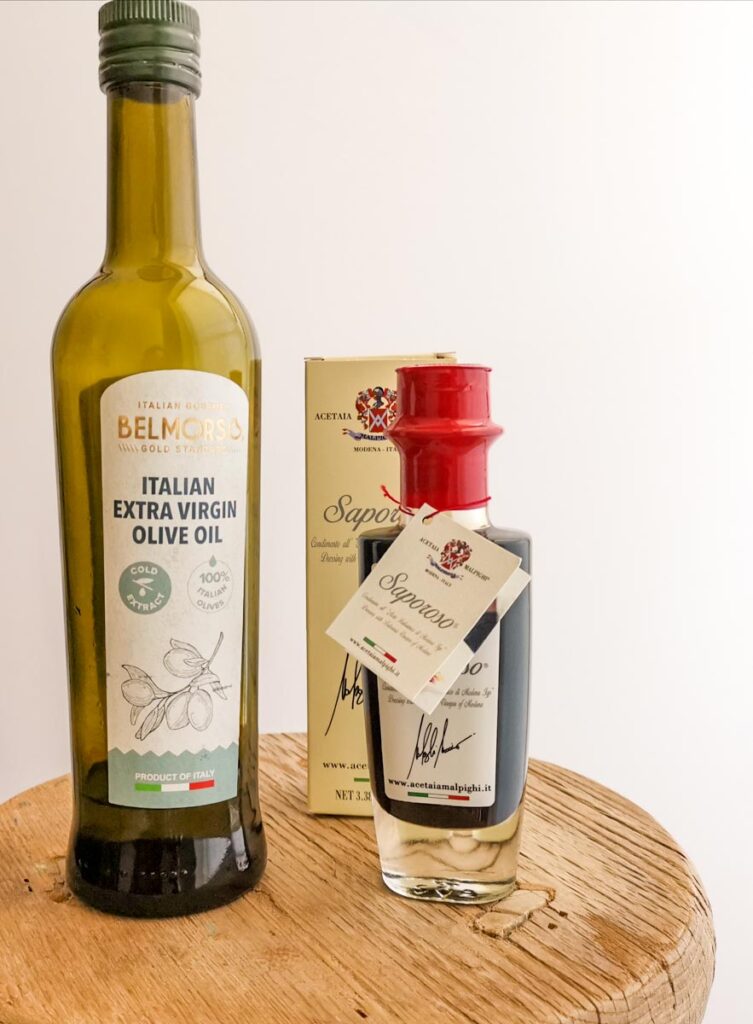
You would think that Italians put Italian dressing in their rice salads. Well, the reality is that extra virgin olive oil is all you need and it’s also the most common dressing we use.
The dressing you should use highly depends on the type of recipe you are making.
If you want a zesty rice salad, and if your ingredients call for that, you can obviously put either balsamic or lemon juice to go with your EVOO.
The classic Italian dressing with olive oil and balsamic would pair amazingly with a rice salad that includes tuna, tomatoes, eggs, cucumbers, and carrots. For this type of recipe I suggest a dark balsamic vinegar of Modena like Saporoso Balsamic Condiment.
On the other hand, a lemon and extra virgin olive oil dressing would pair deliciously with a combination of these ingredients: rice, courgettes, tuna, eggs, peas, parsley and black olives.
Try our authentic Italian tuna and rice salad from Puglia featuring these ingredients from our region:
If you’d like, you can choose your olives from our Artisan Jarred Vegetables Range.

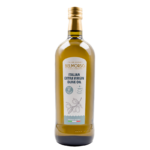

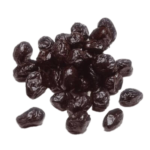
And as usual, feel free to follow the steps on your screen or print out the recipe card.
Happy cooking (or buona preparazione in Italian)!
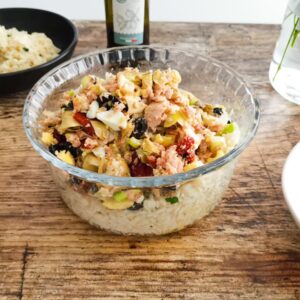

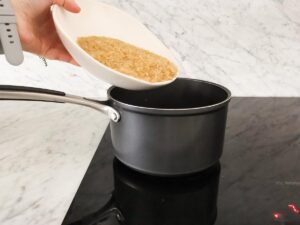

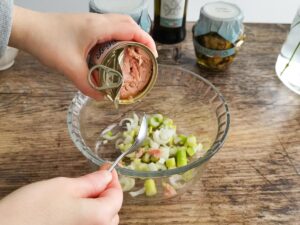
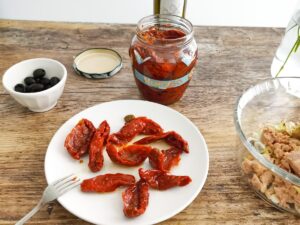
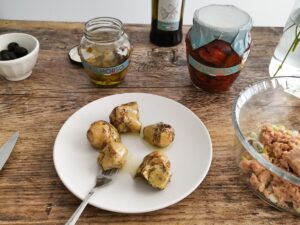
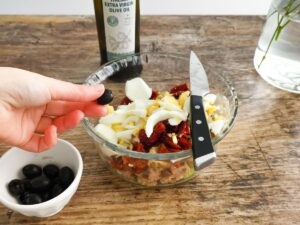
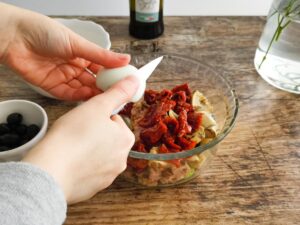
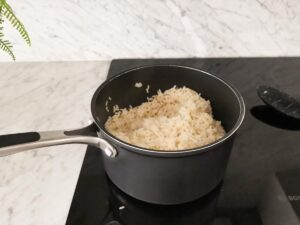
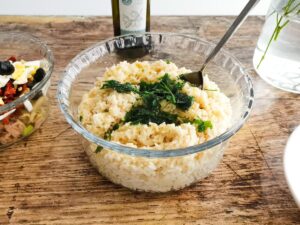
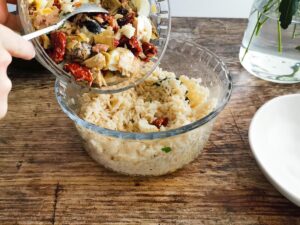
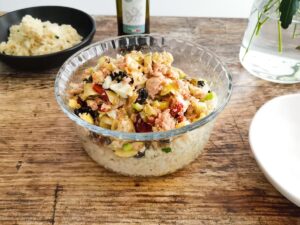
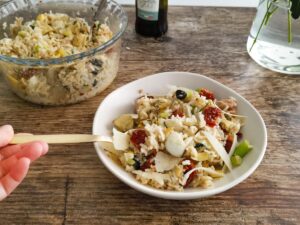
To turn this rice salad vegan, simply omit the tuna and use a vegan parmesan alternative.
Enjoy this Mediterranean rice salad for lunch or dinner, at home or on your next outdoor adventure.
Next time you are craving this dish, you should try one of our older recipes from the archives. They are old but still very tasty. You’ll find a few that are unique and innovative, as well as good alternatives to the classic dish.
Is rice salad healthy?
How long does rice salad last in the fridge?
What to put in rice salad?
What is the best Italian rice?
Do you season rice before or after cooking?
Are rice salads really that healthy or not?
What to do with jarred artichokes?
What herbs can you eat in salad?
What parsley is used for salads?
What is parboiled rice best used for?